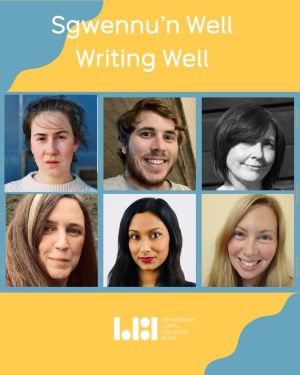Case Study: Sgwennun Well Writing Well
Authors(s), Creator(s) and Contributors: Louise Richards, Creative Executive, Literature Wales
Publication Date: 31/07/2025
Categories: Case Studies
Supporter(s)/Funder(s): Arts Council Wales
Partner(s): Llenyddiaeth Cymru | Literature Wales
Funder(s): Literature Wales and Arts Council Wales Lottery funding
Introduction
'Sgwennu’n Well | Writing Well focuses on intensely developing the skills and knowledge of emerging literary facilitators in the field of Health and Well-being. The programme is 15 month-long professional development programme with aftercare support for a group of 6 facilitators with some experience of project delivery in communities. The first six months offered opportunities to hone skills in areas such as: • project development, management and fundraising • running budgets • capturing and communicating impact • safeguarding their groups and themselves. The group explored the theory and practice of running literature for health and well-being projects for a wide variety of participants in various settings. Each artist also received a minimum of 4 one-to-one sessions with a mentor and a small project budget.
The Challenge
‘Sgwennu’n Well/Writing Well aims to replicate the successful model of Representing Wales, intensely developing a cohort of 6 writers over 15 months through mentoring, talks, workshops, networking and project delivery specifically facilitating workshops for health and well-being. Health and Well-being is one of Literature Wales’ three strategic priorities. Taking part in creative writing and reading has been clinically proven to be beneficial to our well-being, both physical and mental. Literary facilitators are central in delivering this work and more facilitators are needed across Wales, especially under-represented facilitators including Welsh language, Black, Asian and minority ethnic facilitators, disabled facilitators, and those from a low-income backgrounds.
The Approach
Sgwennu'n Well/Writing Well recruited 6 early career writers from across Wales through a public callout. From 2023-25 the cohort attended a weekend retreat at Tŷ Newydd Writing Centre, 5 online workshops: project planning, safeguarding, creative evaluation, fundraising, supervision, and an online Mental Health First Aid Awareness course. Each facilitator received 4 mentoring sessions and a small project budget. Projects included: Re-writing Motherhood with mothers who've experienced pregnancy and birth trauma run by Emma Smith Barton. Writing the Five Senses with people who have difficulties with mental health in Cardiff and Barry run by Helen McSherry. Green Ink Project with young people with concerns about the impact of the climate and ecological crisis. Year 9 pupils at Ysgol Harri Tudur run by Lottie Williams. Enwau for young people with additional learning needs at Ysgol Plas Mawr exploring how outdoor environments support creative writing goals and health and well-being run by Sian Hughes. Sgwennu Ni with a group of 16 Year 7 pupils from Ysgol y Preseli focussing on creativity, resilience, and mental health and well-being run by Steffan Phillips. Dan yr Wyneb rural, bilingual communities, facing challenges such as a pandemic of loneliness run by Grug Muse.
The Impact
A logic model evaluation was designed with external evaluation consultant Gerri Moriarty and further informed by Jane Willis’ Creative and Credible Evaluation approaches. Feedback and data was gathered from participants, practitioners and the partner organisation for each project. Partner staff were present at all workshops supporting the artist and participants and to assess and monitor progress. A Service Level Agreement and meetings provided clear direction and agreed outcomes for the project from the start. Findings: 100% of artists reported an increase in skills and confidence in delivering workshops for health and well-being. 95% of participants reported that their well-being had improved. Workshops helped participants develop their creative writing skills and creative thinking habits, but it also gave them the time and space to explore their creative side, and helped them find their own original voice. "It's a nice feeling to be able to communicate with someone who understands how important it is to be able to write, especially about feeling" participant The full cost of the project was £49,000 and 95% of the funds were paid to artists as fees and expenses.
Lessons Learned
• Takes longer to design and deliver projects for freelancers than initially thought • Create a google drive folder for all project planning templates to share with cohort rather than via email • Provide a training session with mentors with templates for sessions • Zoom sessions to be more interactive if possible • Introduce a session for the cohort to deliver and receive feedback on a taster workshop Learning mentioned above will be implemented for the next Writing Well cohort, including the opportunity to link with Cohort 1's participants.
The Legacy
The Sgwennu'n Well/Writing Well Programme will continue to be adapted and delivered specifically to recruit individuals without fair representation in the creative sector in Wales including Black, Asian and minority ethnic individuals, Disabled individuals or those living with long-term health conditions, and working-class individuals. It is hoped this training programme will lead to an increased number of artists upskilled to deliver creative writing activities for well-being.
Website and Social Media Links
Https://www.literaturewales.org/our-projects/writing-well/ @LitWales https://www.instagram.com/llencymru_litwales/ https://www.facebook.com/LlenCymruLitWales/
Contact Details
Louise Richards post@literaturewales.org
Tags: Literature, spoken word, Well-being, mental health, arts, health, wellbeing

